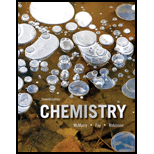
Chemistry (7th Edition)
7th Edition
ISBN: 9780321943170
Author: John E. McMurry, Robert C. Fay, Jill Kirsten Robinson
Publisher: PEARSON
expand_more
expand_more
format_list_bulleted
Question
Chapter 6, Problem 6.74SP
Interpretation Introduction
To determine:
The change of energy to form a lithium cation and bromine anion from a neutral atom of lithium and bromine respectively.
Expert Solution & Answer
Want to see the full answer?
Check out a sample textbook solution
Chapter 6 Solutions
Chemistry (7th Edition)
Ch. 6 - Prob. 6.1PCh. 6 - APPLY 6.2 Which of the following sets of ions are...Ch. 6 - Prob. 6.3PCh. 6 - Conceptual APPLY 6.4 Which of the following...Ch. 6 - Prob. 6.5PCh. 6 - Prob. 6.6ACh. 6 - Prob. 6.7PCh. 6 - Conceptual APPLY 6.8 The figure on the right...Ch. 6 - Prob. 6.9PCh. 6 - Conceptual APPLY 6.10 Which of the indicated three...
Ch. 6 - Prob. 6.11PCh. 6 - Prob. 6.12ACh. 6 - Prob. 6.13PCh. 6 - APPLY 6.14 Calculate the energy of electrostatic...Ch. 6 - Prob. 6.15PCh. 6 - Conceptual APPLY 6.16 One of the following...Ch. 6 - Prob. 6.17PCh. 6 - PROBLEM 6.18 Compare the following two ionic...Ch. 6 - PROBLEM 6.19 An ionic liquid consisting of a bulky...Ch. 6 - Where on the periodic table would you find the...Ch. 6 - Which of the following spheres is likely to...Ch. 6 - Circle the approximate part or parts of the...Ch. 6 - Prob. 6.23CPCh. 6 - This figure represents the successive ionization...Ch. 6 - In the following drawings, red spheres represent...Ch. 6 - Which of the following drawings is more likely to...Ch. 6 - Prob. 6.27CPCh. 6 - Which of the following alkali metal halides has...Ch. 6 - Which of the following alkali metal halides has...Ch. 6 - Three binary compounds are represented on the...Ch. 6 - Given the following values for the formation of...Ch. 6 - What is the difference between a covalent bond and...Ch. 6 - Prob. 6.33SPCh. 6 - What is the difference between a molecule and an...Ch. 6 - Prob. 6.35SPCh. 6 - How many protons and electrons are in each of the...Ch. 6 - What is the identity of the element X in the...Ch. 6 - Prob. 6.38SPCh. 6 - Prob. 6.39SPCh. 6 - Prob. 6.40SPCh. 6 - Prob. 6.41SPCh. 6 - What doubly positive ion has the following...Ch. 6 - Prob. 6.43SPCh. 6 - Prob. 6.44SPCh. 6 - Which element in the transition-metal series Sc...Ch. 6 - Prob. 6.46SPCh. 6 - Prob. 6.47SPCh. 6 - Prob. 6.48SPCh. 6 - Prob. 6.49SPCh. 6 - Prob. 6.50SPCh. 6 - Prob. 6.51SPCh. 6 - Prob. 6.52SPCh. 6 - Prob. 6.53SPCh. 6 - Prob. 6.54SPCh. 6 - Prob. 6.55SPCh. 6 - Prob. 6.56SPCh. 6 - Prob. 6.57SPCh. 6 - Prob. 6.58SPCh. 6 - Prob. 6.59SPCh. 6 - What is the relationship between the electron...Ch. 6 - Prob. 6.61SPCh. 6 - Prob. 6.62SPCh. 6 - Prob. 6.63SPCh. 6 - Prob. 6.64SPCh. 6 - Prob. 6.65SPCh. 6 - Prob. 6.66SPCh. 6 - Prob. 6.67SPCh. 6 - Prob. 6.68SPCh. 6 - Prob. 6.69SPCh. 6 - Prob. 6.70SPCh. 6 - Prob. 6.71SPCh. 6 - Prob. 6.72SPCh. 6 - Prob. 6.73SPCh. 6 - Prob. 6.74SPCh. 6 - Prob. 6.75SPCh. 6 - Find the lattice energy of LiBr(s) in Table 6.3,...Ch. 6 - Prob. 6.77SPCh. 6 - Prob. 6.78SPCh. 6 - Prob. 6.79SPCh. 6 - Prob. 6.80SPCh. 6 - Prob. 6.81SPCh. 6 - Prob. 6.82SPCh. 6 - Prob. 6.83SPCh. 6 - Use the data and the result in Problem 6.78 to...Ch. 6 - Prob. 6.85SPCh. 6 - Prob. 6.86CPCh. 6 - Prob. 6.87CPCh. 6 - Prob. 6.88CPCh. 6 - Prob. 6.89CPCh. 6 - Prob. 6.90CPCh. 6 - Prob. 6.91CPCh. 6 - Prob. 6.92CPCh. 6 - Prob. 6.93CPCh. 6 - Prob. 6.94CPCh. 6 - Prob. 6.95CPCh. 6 - Prob. 6.96CPCh. 6 - Prob. 6.97CPCh. 6 - Prob. 6.98CPCh. 6 - Consider the electronic structure of the element...Ch. 6 - Prob. 6.100MPCh. 6 - Prob. 6.101MP
Knowledge Booster
Learn more about
Need a deep-dive on the concept behind this application? Look no further. Learn more about this topic, chemistry and related others by exploring similar questions and additional content below.Recommended textbooks for you
 ChemistryChemistryISBN:9781305957404Author:Steven S. Zumdahl, Susan A. Zumdahl, Donald J. DeCostePublisher:Cengage Learning
ChemistryChemistryISBN:9781305957404Author:Steven S. Zumdahl, Susan A. Zumdahl, Donald J. DeCostePublisher:Cengage Learning ChemistryChemistryISBN:9781259911156Author:Raymond Chang Dr., Jason Overby ProfessorPublisher:McGraw-Hill Education
ChemistryChemistryISBN:9781259911156Author:Raymond Chang Dr., Jason Overby ProfessorPublisher:McGraw-Hill Education Principles of Instrumental AnalysisChemistryISBN:9781305577213Author:Douglas A. Skoog, F. James Holler, Stanley R. CrouchPublisher:Cengage Learning
Principles of Instrumental AnalysisChemistryISBN:9781305577213Author:Douglas A. Skoog, F. James Holler, Stanley R. CrouchPublisher:Cengage Learning Organic ChemistryChemistryISBN:9780078021558Author:Janice Gorzynski Smith Dr.Publisher:McGraw-Hill Education
Organic ChemistryChemistryISBN:9780078021558Author:Janice Gorzynski Smith Dr.Publisher:McGraw-Hill Education Chemistry: Principles and ReactionsChemistryISBN:9781305079373Author:William L. Masterton, Cecile N. HurleyPublisher:Cengage Learning
Chemistry: Principles and ReactionsChemistryISBN:9781305079373Author:William L. Masterton, Cecile N. HurleyPublisher:Cengage Learning Elementary Principles of Chemical Processes, Bind...ChemistryISBN:9781118431221Author:Richard M. Felder, Ronald W. Rousseau, Lisa G. BullardPublisher:WILEY
Elementary Principles of Chemical Processes, Bind...ChemistryISBN:9781118431221Author:Richard M. Felder, Ronald W. Rousseau, Lisa G. BullardPublisher:WILEY

Chemistry
Chemistry
ISBN:9781305957404
Author:Steven S. Zumdahl, Susan A. Zumdahl, Donald J. DeCoste
Publisher:Cengage Learning

Chemistry
Chemistry
ISBN:9781259911156
Author:Raymond Chang Dr., Jason Overby Professor
Publisher:McGraw-Hill Education

Principles of Instrumental Analysis
Chemistry
ISBN:9781305577213
Author:Douglas A. Skoog, F. James Holler, Stanley R. Crouch
Publisher:Cengage Learning

Organic Chemistry
Chemistry
ISBN:9780078021558
Author:Janice Gorzynski Smith Dr.
Publisher:McGraw-Hill Education

Chemistry: Principles and Reactions
Chemistry
ISBN:9781305079373
Author:William L. Masterton, Cecile N. Hurley
Publisher:Cengage Learning

Elementary Principles of Chemical Processes, Bind...
Chemistry
ISBN:9781118431221
Author:Richard M. Felder, Ronald W. Rousseau, Lisa G. Bullard
Publisher:WILEY
Periodic Properties of Elements | Chemistry | IIT-JEE | NEET | CBSE | Misostudy; Author: Misostudy;https://www.youtube.com/watch?v=L26rRWz4_AI;License: Standard YouTube License, CC-BY
Periodic Trends: Electronegativity, Ionization Energy, Atomic Radius - TUTOR HOTLINE; Author: Melissa Maribel;https://www.youtube.com/watch?v=0h8q1GIQ-H4;License: Standard YouTube License, CC-BY